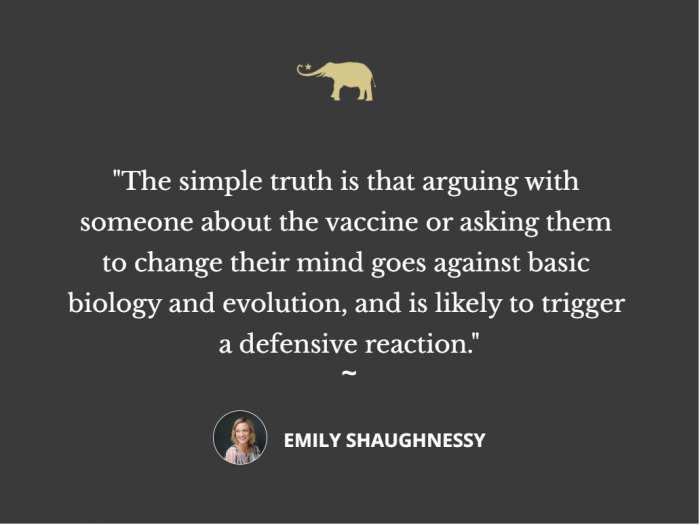Your cousin just shared a vaccine meme on Facebook and a heated argument ensued in the comments.
Your company is requiring vaccinations and employees are pushing back.
You run out for groceries and pass a group of protestors outside the local hospital.
Every day, the disparate responses to COVID-19 and the vaccines become more polarized as friends and strangers share anecdotes, reference data, and attempt to disprove the perspectives of the “other side.” It seems everyone has become an expert on infectious disease. Or at least an expert on research.
But are we getting anywhere? Are all of these discussions and arguments moving the needle or are we just further entrenching ourselves in our positions and entombing ourselves in our respective echo chambers?
At no other time in history have we had so much access to information and so many outlets through which to spread it instantaneously. Theoretically, this should make our generation the most informed and capable of making rational decisions.
Yet accusations of misinformation and twisted truths are being levelled from all sides of the vaccine controversy and our access to infinite data and “evidence” doesn’t seem to be helping us reach critical consensus.
Here’s why we’re missing each other and why we have a very slim chance of changing anyone’s mind about the vaccine issue by defending our own position.
Data won’t sway a value-based opinion
Attempting to change someone’s opinion on the COVID vaccine using data and reasoning is based on a misunderstanding of how the human brain works during a crisis. We may like to believe that a reasonable human forms their opinion after a careful evaluation of objective facts and is open to changing their viewpoint if presented with new, credible information. Unfortunately, that is rarely the case.
More often than not, our confirmation biases lead us to seek information that validates what we already believe on an emotional or value-based level. Social media and even search engines reinforce this phenomenon, filtering content to show us what we are predisposed to agree with.
These emotional-based reactions and decisions are heightened during a crisis situation (such as a global pandemic) when the brain’s amygdala is responding to a perceived threat, flooding the body with stress hormones and inhibiting the reasoning and processing abilities of the prefrontal cortex. It is incredibly difficult for a person to logically process new information when they are in the middle of a threat response.
Biology won’t let us change our minds
Did you know your genes play a part in determining how open-minded you are? Emerging research shows that gene expression can affect people’s ability to consider new ideas and change their minds—and can even predict political stance.
Mari Fitzduff highlights some of these studies in her book, Our Brains at War, including a study on a gene variant called DRD4-7R, which has been linked to open-mindedness (worth a read if you’re interested in the neuroscience of conflict). These genetic predispositions are strengthened during a crisis as we grapple with primal concepts like fear, control, and survival.
Additionally, as humans age, many of us become less able to process and learn new information. Our brains shift focus from the creation of new neural pathways to stabilizing the connections we’ve already made. The hippocampus, a part of the brain that supports learning and memory, also deteriorates with age. That means that factors beyond a person’s control, such as genetic makeup and age, will play a big role in whether they are able to change their minds about a topic.
Polarization is inevitable
Newton’s Third Law states that for every action, there is an equal and opposite reaction. From nature to physics to relationships to politics, the universe is constantly trying to achieve a balance of forces. Here is a simple example: if you touch palms lightly with someone then suddenly apply a lot of pressure, the other person will push back. It’s instinct.
The clash of values we’re seeing now around the vaccine is not new and has in fact been around since the beginning of time. There are many ways to characterize the debate: safety vs. freedom; well-being of the individual vs. well-being of the group; trust in self vs. trust in experts. These are oversimplifications of course, but breaking the vaccine discussion down to the underlying core values helps us see that this same polarization is present in many other areas of our lives. For example, think of your closest relationship: who values independence and autonomy more and who values closeness and consistency? Who wants to try something new and who wants to stick to the tried and true? Do these dynamics ever create issues in your relationship?
The fact is that these values cannot exist without the other. And the closer we become to another person (or a group of people), and the more we depend on them, the more our collective systems will attempt to achieve homeostasis by the expression of diverse values. It is a beautiful feature of human relationships, if we understand why it happens and how to use it to our advantage.
Great, so now what?
The simple truth is that arguing with someone about the vaccine or asking them to change their mind goes against basic biology and evolution, and is likely to trigger a defensive reaction. Yet, there is still a way to have productive conversations about this issue and others like it.
Not all of us will be able to have these conversations. Some of us are just too angry or too scared. Some of us are carrying too much grief or trauma. Some of us just don’t want to.
But for those of us who are willing, starting the discussion at the level of values and emotions instead of facts and reason can provide a foundation of shared reality from which to connect. Working to understand and empathize with another person’s position instead of trying to prove your own may allow both your nervous systems to relax and allow for the consideration of new concepts. Otherwise, even our most perfectly crafted arguments will sail past each other like ships in the night.
It’s not easy to connect with someone who is operating in a wildly different reality. Especially if you see their view as objectively wrong or ignorant. Especially if their stance seems to be threatening your health, your family, or your life. Holding space for their reality may even feel like a betrayal of your own values. In these situations, it is easier to try to prove someone wrong than it is to validate their position. But which is a more effective approach?
If we want to make any kind of difference, it will start with understanding the values of the person on the “other side” and identifying overlaps. Maybe you don’t prioritize their values the same way and maybe you have different strategies for expressing those values, but when we’re talking about the concepts at the core of the vaccine debate (things like survival, freedom, health, safety, self-expression, and trust) we are talking about universal human needs that everyone shares.
This is where we meet each other if we want to see change. This is bigger than COVID or the vaccine. This is about whether we, as an interdependent species, are able to communicate and collaborate across seemingly irreconcilable differences or whether we will continue to push each other to extremes to the detriment of each other and the planet.
~









Read 27 comments and reply